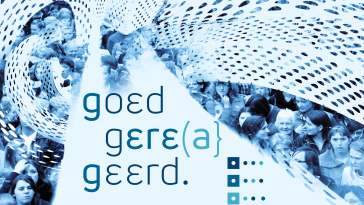Debat in Soφie (tijdschrift Christelijke filosofie) ‘Framing is een overtuigingstechniek. De techniek bestaat eruit woorden en beelden zo te kiezen, dat daarbij impliciet een aantal aspecten van het beschrevene worden uitgelicht. Deze uitgelichte aspecten helpen om een bepaalde lezing van het beschrevene of een mening daarover te propageren. Zowel in de politiek als in de reclame wordt framing bewust (en onbewust) ingezet.’ (Bron: WIkipedia)
DOCUMENT
In dit rapport wordt verslag gedaan van een onderzoek naar aanpassingen in brieven die uit worden gestuurd naar huurders met een betalingsachterstand bij woonstichting De Key. Het doel van het onderzoek was om na te gaan welke aanpassingen effectief zijn in het stimuleren van huurders met een betalings-achterstand om contact op te nemen met De Key. Er is hiervoor gekeken naar de effecten van versimpeling en framing. In dit rapport komen de resultaten van twee experimenten en interviews met huurders, medewerkers van De Key en een deurwaarder over de aangepaste communicatiestrategie aan de orde.
DOCUMENT

This book explores fundamental socio-economic trends that are radically changing perspectives on the relationship between people and the world around them. Focusing on the principles of sustainability, circularity and inclusivity, it illustrates how these trends form the breeding ground for a new economy embodying a logic of collectiveness.Expert contributors highlight six specific global developments that are contributing to societal transition: digitalization, circularity, the bio-based economy, sharing, self-production, and the internet of things and services. They demonstrate how these trends question the foundations and social contracts underlying the current linear economy. They identify a new generation of business models based on key features including intra-organisational collaboration, transparency, and high-level coordination to ensure economic developments contribute to a fair society. Through an analysis of how these trends may develop going forward, they provide innovative recommendations for strategy and policy development alongside a conceptual toolbox for realising the economy of the future.Framing the Economy of the Future is an essential resource for students and scholars of economics, business and sustainable development. It is also an invaluable guide for professionals in public administration and strategic management.
LINK
The energy transition is a highly complex technical and societal challenge, coping with e.g. existing ownership situations, intrusive retrofit measures, slow decision-making processes and uneven value distribution. Large scale retrofitting activities insulating multiple buildings at once is urgently needed to reach the climate targets but the decision-making of retrofitting in buildings with shared ownership is challenging. Each owner is accountable for his own energy bill (and footprint), giving a limited action scope. This has led to a fragmented response to the energy retrofitting challenge with negligible levels of building energy efficiency improvements conducted by multiple actors. Aggregating the energy design process on a building level would allow more systemic decisions to happen and offer the access to alternative types of funding for owners. “Collect Your Retrofits” intends to design a generic and collective retrofit approach in the challenging context of monumental areas. As there are no standardised approaches to conduct historical building energy retrofits, solutions are tailor-made, making the process expensive and unattractive for owners. The project will develop this approach under real conditions of two communities: a self-organised “woongroep” and a “VvE” in the historic centre of Amsterdam. Retrofit designs will be identified based on energy performance, carbon emissions, comfort and costs so that a prioritisation strategy can be drawn. Instead of each owner investing into their own energy retrofitting, the neighbourhood will invest into the most impactful measures and ensure that the generated economic value is retained locally in order to make further sustainable investments and thus accelerating the transition of the area to a CO2-neutral environment.
We onderzoeken hoe bestaande, effectieve, valpreventie-programma’s goed kunnen worden geïmplementeerd. Dit doen we samen met belangrijke stakeholders, zoals thuiswonende ouderen met een verhoogd valrisico, fysiotherapeuten, wijkverpleegkundigen, apothekers, welzijnswerkers en beleidsmakers.
Het publieke debat over issues in de huidige samenleving vindt permanent plaats. Publieke debatten kennen een golfbeweging en veranderen soms in een crisis. De gedigitaliseerde samenleving maakt de reactie van organisaties op issues vele malen ingewikkelder. In dit project staat de vraag centraal hoe communicatieprofessionals van publieke organisaties beter kunnen omgaan met publicitaire golfbewegingen van voortdurend debat, regelmatige issues en incidentele crises.
